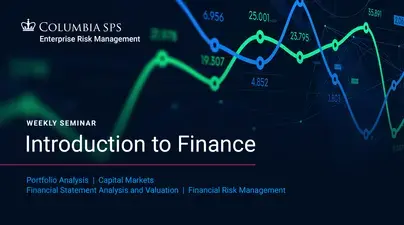Introduction to Finance Seminar, Presented by the ERM Program

September 6 – December 13, 2025
Time for all workshops: 11:00 am – 12:30 pm ET
The Introduction to Finance Seminar workshops cover various finance related concepts such as Time Value of Money, Stock and Bond Return Analysis, Financial Statement Analysis and Corporate Valuations, as well as an overview of the capital markets. Students are welcome to attend any workshop. The workshops are grouped into 4 main themes of finance as follows:
• Modern Portfolio Analysis
• Capital Markets
• Financial Statement Analysis & Corporate Valuation
• Financial Risk Management
How To Join a Session
Click here at 11:00 am ET on the day of your desired workshop to join virtually. Each workshop ends at 12:30 pm ET.
Workshop Info
Saturday, September 6 | 11:00 am to 12:30 pm ET
Time Value of Money
It starts with money and time. How much do I invest today so I have enough money to retire in 45 years? What is my rate or return of investment if I receive fixed income every month for some period? These are some of the questions that we are answering using financial mathematics.
Saturday, September 13 | 11:00 am to 12:30 pm ET
Financial Statement Analysis
In this workshop, you will learn about the information that is included in each financial statement, the correct term for every item in each statement, and how to read and understand the three types of statements. By looking at examples of statements, you will see how the information is provided and how the information is used to perform the analysis to get an overall picture of a company's performance.
Saturday, September 20 | 11:00 am to 12:30 pm ET
The Stock Market
This workshop will give an overview of the U.S. stock exchange markets, the regulations of these exchanges, and discuss various market indices such as the Dow Jones Industrial Average (DJIA), Standard & Poor’s Index and others. It will also cover how investors trade stock and define all the parties involved in these transactions.
Saturday, September 27 | 11:00 am to 12:30 pm ET
Options
This workshop will give an overview of the options market. It will describe strategies used by investors for hedging or speculating on significant increases or decreases in stock price using derivatives.
Saturday, October 4 | 11:00 am to 12:30 pm ET
The Primary Equity Market
Depending on where a company is in its business development cycle, capital raising ranges from raising early seed money, to raising private equity, to going public through an Initial Public Offering. This workshop focuses on the equity primary market.
Saturday, October 11 | 11:00 am to 12:30 pm ET
The Bond Market
This workshop will give an overview of the secondary bond market and how investors trade bonds. Entailed in the analysis includes a risk evaluation of the present factors including impacts of interest rate fluctuations, credit rating upgrades and downgrades, and refinancing risk. It will also cover various scenarios analyses to determine factors such as duration and convexity.
Saturday, October 18 | 11:00 am to 12:30 pm ET
Primary Debt Markets
This workshop will summarize the various approaches through which a company can access the bond markets. The workshop will outline the process by which a company can raise debt publicly or privately through the vehicles a company issues when looking to raise capital in the form of debt.
Saturday, October 25 | 11:00 am to 12:30 pm ET
Primary Credit Markets
This workshop summarizes how companies access the credit or loan markets. The workshop outlines the best practices a company follows when raising corporate loans from a syndicate, club, or private markets.
Saturday, November 1 | 11:00 am to 12:30 pm ET
Risk & Return
The workshop will first establish the basics for measuring risk and quantifying the expected return, as well introduce ways to get increased efficiency out of this relationship through allocation and diversification for higher portfolio efficiency. The covariance and correlation analysis are the factors that contribute to a minimum variance and achieve an efficient frontier.
Saturday, November 8 | 11:00 am to 12:30 pm ET
The Capital Asset Pricing Model
Seeking Alpha or “beating” the market is the investor’s number one objective. What are the investors minimum return expectations, how do those expectations compare to the market and or other asset classes? This workshop assesses the risk or volatility of a portfolio of stocks to understand such movements versus market movements using regression analysis.
Saturday, November 15 | 11:00 am to 12:30 pm ET
Portfolio Risk
What are the different measures of portfolio risk? This workshop will emphasize all the fundamental ways to compare portfolio results via performance measurements ratios such as the Sharpe Ratio, Jensen’s Alpha, M Squared, Treynor Measure that are used extensively on wall street to gain valuable insight using comparisons.
Saturday, November 22 | 11:00 am to 12:30 pm ET
Corporate Valuation
This workshop covers eight different methods of valuing a firm’s worth. These are methods that are currently used on Wall Street to value both private and publicly traded companies.
Saturday, December 6 | 11:00 am to 12:30 pm ET
Private Equity Valuation
This valuation method called the Discounted Cash Flow (DCF) method is broadly used by many investors, advisors, banks, and academics. This approach values a company by calculating the present value of its projected free cash flow (FCF).
Saturday, December 13 | 11:00 am to 12:30 pm ET
Transaction Analysis (M&A, LBO)
Dive into the intricate world of Transaction Analysis, encompassing Mergers and Acquisitions (M&A) and Leveraged Buyouts (LBO). Explore the nuances of pooling capital to orchestrate a buyout, understanding how syndicates are meticulously structured while balancing market risk, credit risk, and equity returns. Gain valuable insights into the multifaceted risks and rewards inherent in these high-stakes financial maneuvers.
Apply
We encourage you to apply as soon as possible.
Request Information
Stay in the know with updates sent straight to your inbox.